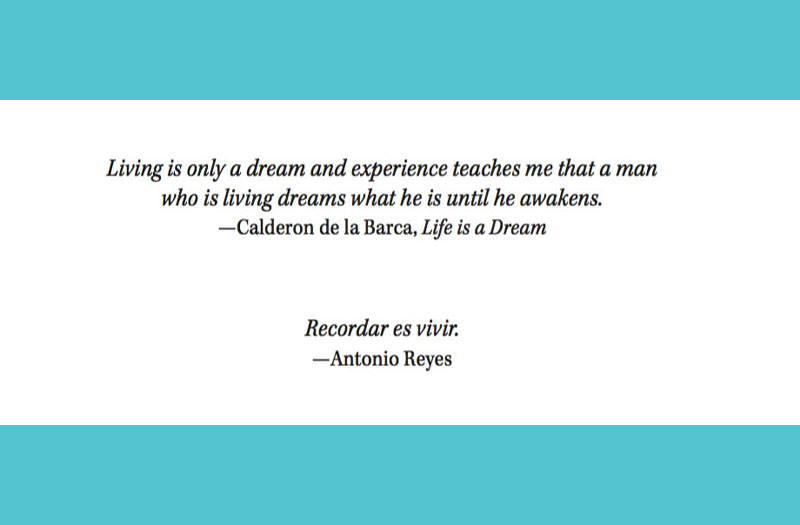If you have looked at my novel, Behind the Locked Door, you will see two inscriptions at the beginning of the book. The first, “living is only a dream and experience teaches me that a man who is living dreams what he is until he awakens,” is from a Spanish-language play, La vida es sueno (Life is a Dream), by Pedro Calderon de la Barca (1635). The meaning is self-explanatory although how to interpret that meaning is far from clear. In fact, trying to interpret it is a primary theme in the book.
The second inscription, recordar es vivir (to remember is to live again) is a Spanish phrase brought to my attention by a friend I met on my last trip to Oaxaca just in time to include in the book before it was printed.
One never knows what will come along to stir the imagination. I worked for years on my novel and just when I thought it was complete a new friend arrived to give me the three words that pulled everything together.
Antonio is a man with a presence. You feel him in the room when you walk in. His wife, Maria, has a beautiful smile and a playful sense of humor. They live in Texas. Antonio loves to travel with his family. His goal is to take his grandkids to all the national parks in America, and he is well on the way. They love America and Mexico and the people on both sides of the border. Most of all, they are fun to be with.
Antonio not only gave me the final three words of my novel, he gave me the title of a short story I posted a few months ago (Casa Maestro Tiene Su Librito-Every Teacher has his Little Book).
Maybe in a friendly way he was laughing at me. I think, though, that he was subtly telling me not to take myself too seriously. Writing a novel, publishing, printing, and getting it out there is a daunting task at least for me. The natural thing as the end appears in sight is to give yourself a pat on the shoulder, feel a little pride, and succumb to the hubris of success.
I have to constantly remind myself how lucky (not brilliant) I am, how much I depend on others, and not to take sole credit for whatever accomplishments may come my way. I wrote a paragraph in the novel about just this revelation. Its about a character, Roger Penalt, who learns these truths about himself. I’ll end this short post with that excerpt from my book.
He sat at a round table sipping a beer and making notes on a yellow pad with a Bic pen. He was alone after spending most of the day immersed in the crowd along First Street at El Mercado Principal.Immersed? That was the wrong word. Something peculiar had happened: He’d been lifted out of one life and plunged into another. He met people from the ranches and mountain pueblos—goat farmers and fishermen, railroad workers, weavers, stockmen, truckdrivers, beekeepers. He had arrived in Mexico believing he was in control of his life, but soon discovered life is a random churning of events. Nothing is pinned down. He was an open space, a field whose boundaries extended outward without end. He viewed his past with disdain, repelled by what he had been. Like his friend at Yawnix, he’d been too full of himself. To worship your own genius is as bad as worshiping the idols in the Mexican churches. For the first time, Penalt understood the meaning of humility—ordinary people are the least ordinary and the most extraordinary of all. A slow-burning fire of excitement ignited at his core. He had to be careful not to extinguish the flame. It was easy to slip back into the swamp, the swamp of personality that could pull him back down and drown him. He was Roger Penalt with a Bic pen and a yellow pad of paper, no more, no less, but he dreamed… he dreamed.
… excerpt from Behind the Locked Door (Chapter 14)

